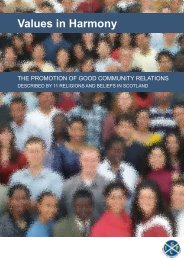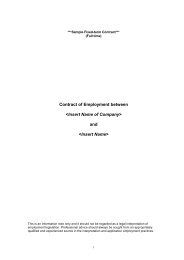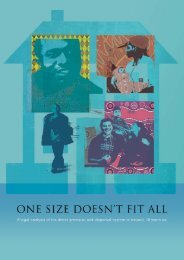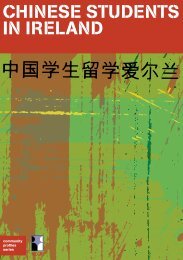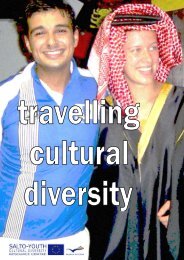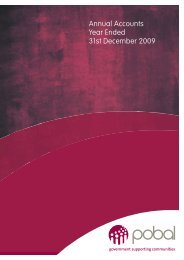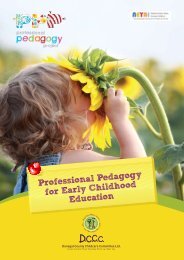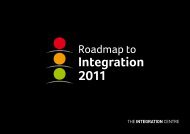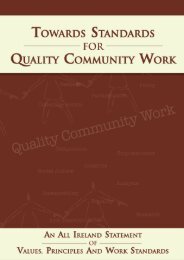Intercultural Education in the Post-Primary School - National Council ...
Intercultural Education in the Post-Primary School - National Council ...
Intercultural Education in the Post-Primary School - National Council ...
You also want an ePaper? Increase the reach of your titles
YUMPU automatically turns print PDFs into web optimized ePapers that Google loves.
INTERCULTURAL EDUCATION ACROSS THE CURRICULUM 5with o<strong>the</strong>rs <strong>in</strong> that participation’. This andmany of <strong>the</strong> o<strong>the</strong>r aims of <strong>the</strong> physicaleducation programme are compatible withand supportive of <strong>in</strong>tercultural educatione.g. ‘develop <strong>in</strong> students an ability to make<strong>in</strong>formed judgements…’; ‘to enablestudents to take responsibility for <strong>the</strong>organisation and development of <strong>the</strong>irlearn<strong>in</strong>g…’. The P.E. curriculum embodiesmany values and skills central to<strong>in</strong>tercultural education, e.g. awareness of<strong>the</strong> impact of many cultures on sport/danceand <strong>the</strong> similarities and diversity whichexists; <strong>the</strong> importance of fair play; <strong>the</strong>ability to communicate and work <strong>in</strong> groups(co-operat<strong>in</strong>g, resolv<strong>in</strong>g disagreementpeacefully and demonstrat<strong>in</strong>g respect for<strong>the</strong> op<strong>in</strong>ions of o<strong>the</strong>rs, etc). The underly<strong>in</strong>gpr<strong>in</strong>ciples and approaches to physicaleducation foster an acceptance of successand failure and provide challenges andachievement for all students throughpersonal goal sett<strong>in</strong>g, co-operative gamesand group work.With<strong>in</strong> an <strong>in</strong>clusive Physical <strong>Education</strong>programme:• Students receive many opportunities todevelop self-esteem and confidence, as aresult of <strong>the</strong>ir experience with<strong>in</strong> a broadwell-balanced programme, which catersfor <strong>the</strong> needs of all students.• Students develop <strong>the</strong> ability to identifyand challenge unfairness with<strong>in</strong> physicalactivities and learn to respect <strong>the</strong>players, officials and rules associatedwith each activity.• Students should experience a balance ofcompetitive and non-competitiveactivities thus foster<strong>in</strong>g a lifelong <strong>in</strong>terest<strong>in</strong> sports/leisure.• Students develop an awareness of <strong>the</strong>orig<strong>in</strong>s and history of many games and<strong>the</strong> modification of games over <strong>the</strong>years. Students may also be exposed to arange of different dance formsrepresent<strong>in</strong>g and celebrat<strong>in</strong>g a diversityof cultures/traditions (folk dance, l<strong>in</strong>edance, salsa dance etc.).<strong>Intercultural</strong> <strong>Education</strong> <strong>in</strong> <strong>the</strong> <strong>Post</strong>-<strong>Primary</strong> <strong>School</strong> 73




